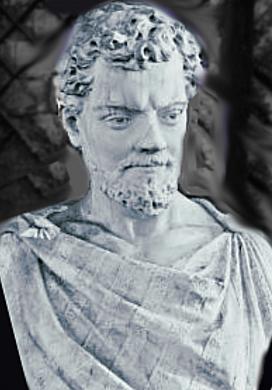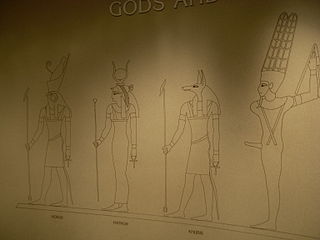Related Research Articles

Epicurus was an ancient Greek philosopher and sage who founded Epicureanism, a highly influential school of philosophy. He was born on the Greek island of Samos to Athenian parents. Influenced by Democritus, Aristippus, Pyrrho, and possibly the Cynics, he turned against the Platonism of his day and established his own school, known as "the Garden", in Athens. Epicurus and his followers were known for eating simple meals and discussing a wide range of philosophical subjects. He openly allowed women and slaves to join the school as a matter of policy. Of the over 300 works said to have been written by Epicurus about various subjects, the vast majority have been destroyed. Only three letters written by him—the letters to Menoeceus, Pythocles, and Herodotus—and two collections of quotes—the Principal Doctrines and the Vatican Sayings—have survived intact, along with a few fragments of his other writings. As a result of his work's destruction, most knowledge about his philosophy is due to later authors, particularly the biographer Diogenes Laërtius, the Epicurean Roman poet Lucretius and the Epicurean philosopher Philodemus, and with hostile but largely accurate accounts by the Pyrrhonist philosopher Sextus Empiricus, and the Academic Skeptic and statesman Cicero.
Materialism is a form of philosophical monism which holds that matter is the fundamental substance in nature, and that all things, including mental states and consciousness, are results of material interactions of material things. According to philosophical materialism, mind and consciousness are by-products or epiphenomena of material processes, without which they cannot exist. Materialism directly contrasts with idealism, according to which consciousness is the fundamental substance of nature.

Theism is broadly defined as the belief in the existence of at least one deity. In common parlance, or when contrasted with deism, the term often describes the classical conception of God that is found in monotheism — or gods found in polytheistic religions — a belief in God or in gods without the rejection of revelation as is characteristic of deism.

Titus Lucretius Carus was a Roman poet and philosopher. His only known work is the philosophical poem De rerum natura, a didactic work about the tenets and philosophy of Epicureanism, which usually is translated into English as On the Nature of Things—and somewhat less often as On the Nature of the Universe. Very little is known about Lucretius's life; the only certainty is that he was either a friend or client of Gaius Memmius, to whom the poem was addressed and dedicated. De rerum natura was a considerable influence on the Augustan poets, particularly Virgil and Horace. The work was almost lost during the Middle Ages, but was rediscovered in 1417 in a monastery in Germany by Poggio Bracciolini and it played an important role both in the development of atomism and the efforts of various figures of the Enlightenment era to construct a new Christian humanism.

Epicureanism is a system of philosophy founded around 307 BCE based upon the teachings of Epicurus, an ancient Greek philosopher. Epicurus was an atomist and materialist, following in the steps of Democritus. His materialism led him to religious skepticism and a general attack on superstition and divine intervention. Originally a challenge to Platonism, its main opponent later became Stoicism. Although Epicureanism is a form of hedonism insofar as it declares pleasure to be its sole intrinsic goal, the concept that the absence of pain and fear constitutes the greatest pleasure, and its advocacy of a simple life, make it very different from hedonism as colloquially understood. Following the Cyrenaic philosopher Aristippus, Epicurus believed that the greatest good was to seek modest, sustainable pleasure in the form of a state of ataraxia and aponia through knowledge of the workings of the world and limiting desires. Correspondingly, Epicurus and his followers generally withdrew from politics because it could lead to frustrations and ambitions that would conflict with their pursuit of virtue and peace of mind.
Nothing, no-thing, or no thing, is the complete absence of anything; the opposite of everything, or its complement. The concept of nothing has been a matter of philosophical debate since at least the 5th century BC. Early Greek philosophers argued that it was impossible for nothing to exist. The atomists allowed nothing but only in the spaces between the invisibly small atoms. For them, all space was filled with atoms. Aristotle took the view that there exists matter and there exists space, a receptacle into which matter objects can be placed. This became the paradigm for classical scientists of the modern age like Newton. Nevertheless, some philosophers, like Descartes, continued to argue against the existence of empty space until the scientific discovery of a physical vacuum.

De rerum natura is a first-century BC didactic poem by the Roman poet and philosopher Lucretius with the goal of explaining Epicurean philosophy to a Roman audience. The poem, written in some 7,400 dactylic hexameters, is divided into six untitled books, and explores Epicurean physics through poetic language and metaphors. Namely, Lucretius explores the principles of atomism; the nature of the mind and soul; explanations of sensation and thought; the development of the world and its phenomena; and explains a variety of celestial and terrestrial phenomena. The universe described in the poem operates according to these physical principles, guided by fortuna ("chance"), and not the divine intervention of the traditional Roman deities.

Libertarianism is one of the main philosophical positions related to the problems of free will and determinism which are part of the larger domain of metaphysics. In particular, libertarianism is an incompatibilist position which argues that free will is logically incompatible with a deterministic universe. Libertarianism states that since agents have free will, determinism must be false and vice versa.
The existence of God is a subject of debate in theology, philosophy of religion and popular culture. A wide variety of arguments for and against the existence of God or deities can be categorized as logical, empirical, metaphysical, subjective or scientific. In philosophical terms, the question of the existence of God or deities involves the disciplines of epistemology and ontology and the theory of value.

Creatio ex nihilo is the doctrine that matter is not eternal but had to be created by some divine creative act. It is a theistic answer to the question of how the universe came to exist. It is in contrast to Ex nihilo nihil fit or "nothing comes from nothing", which means that all things were formed from preexisting things; an idea by the Greek philosopher Parmenides about the nature of all things, and later more formally stated by Titus Lucretius Carus.
Atheism is an absence of belief in the existence of deities. In a narrower sense, atheism is specifically the position that there are no deities and any statements to the contrary are false ones. The English term 'atheist' was used at least as early as the sixteenth century and atheistic ideas and their influence have a longer history.
Religious skepticism is a type of skepticism relating to religion. Religious skeptics question religious authority and are not necessarily anti-religious but rather are skeptical of either specific or all religious beliefs and/or practices. Socrates was one of the most prominent and first religious skeptics of whom there are records; he questioned the legitimacy of the beliefs of his time in the existence of the Greek gods. Religious skepticism is not the same as atheism or agnosticism, and some religious skeptics are deists.
Atomism is a natural philosophy proposing that the physical universe is composed of fundamental indivisible components known as atoms.
Hellenistic philosophy is Ancient Greek philosophy corresponding to the Hellenistic period in Ancient Greece, from the death of Alexander the Great in 323 BC to the Battle of Actium in 31 BC. The dominant schools of this period were the Stoics, the Epicureans and the Skeptics.
Atheism, in the broadest sense, is an absence of belief in the existence of deities. Less broadly, atheism is a rejection of the belief that any deities exist. In an even narrower sense, atheism is specifically the position that there are no deities. Atheism is contrasted with theism, which in its most general form is the belief that at least one deity exists.

Polytheism is the belief and worship in multiple deities or spirits, which are usually assembled into a pantheon of gods and goddesses, along with their own religious sects and rituals. Polytheism is a type of theism. Within theism, it contrasts with monotheism, the belief in a singular God who is, in most cases, transcendent. In religions that accept polytheism, the different gods and goddesses may be representations of forces of nature or ancestral principles; they can be viewed either as autonomous or as aspects or emanations of a creator deity or transcendental absolute principle, which manifests immanently in nature. Polytheists do not always worship all the gods equally; they can be in monolatrists or kathenotheists, specializing in the worship of one particular deity only or at certain times (respectively).
A sage, in classical philosophy, is someone who has attained wisdom. The term has also been used interchangeably with a 'good person', and a 'virtuous person'. Among the earliest accounts of the sage begin with Empedocles' Sphairos. Horace describes the Sphairos as "Completely within itself, well-rounded and spherical, so that nothing extraneous can adhere to it, because of its smooth and polished surface." Alternatively, the sage is one who lives "according to an ideal which transcends the everyday."
Free will in antiquity is a philosophical and theological concept. Free will in antiquity was not discussed in the same terms as used in the modern free will debates, but historians of the problem have speculated who exactly was first to take positions as determinist, libertarian, and compatibilist in antiquity. There is wide agreement that these views were essentially fully formed over 2000 years ago. Candidates for the first thinkers to form these views, as well as the idea of a non-physical "agent-causal" libertarianism, include Democritus, Aristotle, Epicurus, Chrysippus, and Carneades.
Eternal oblivion is the philosophical, religious, or scientific concept of one's consciousness forever ceasing upon death. Pamela Health and Jon Klimo write that this concept is mostly associated with religious skepticism, secular humanism, nihilism, agnosticism, and atheism. According to most modern neuroscience theories of consciousness, the brain is the basis of subjective experience, agency, self-awareness, and awareness of the surrounding natural world. When brain death occurs, all brain function forever ceases.
Philosophy of motion is a branch of philosophy concerned with exploring questions on the existence and nature of motion. The central questions of this study concern the epistemology and ontology of motion, whether motion exists as we perceive it, what is it, and, if it exists, how does it occur. The philosophy of motion is important in the study of theories of change in natural systems and is closely connected to studies of space and time in philosophy.
References
- ↑ "Casualism", Merriam-Webster.
- ↑ "Kirchner: Kasualismus". Textlog.de. Retrieved 27 November 2018.
- 1 2 "Epicurus", Plato.Stanford
- 1 2 "Epicurus | Internet Encyclopedia of Philosophy". Archived from the original on 2016-05-08. Retrieved 2016-05-01.
- ↑ "On the Nature of Things by Titus Lucretius Carus". Gutenberg.org. Retrieved 27 November 2018.